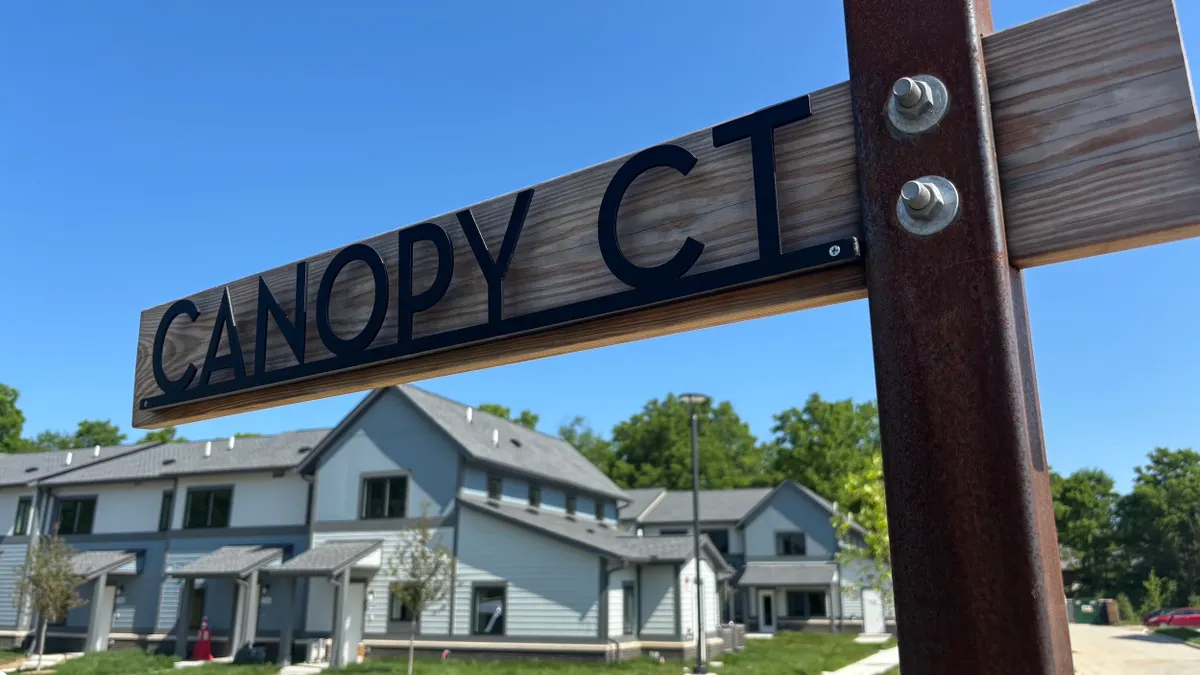Dive Brief:
- Dozens of residents have already moved to Veridian at County Farm, an all-electric, mixed-income master-planned community under construction in Ann Arbor, Michigan, its developer said in an interview.
- With more than 1.3 megawatts of rooftop solar capacity plus advanced heat pumps and backup batteries in every home, Veridian is a sustainable model in a city on the vanguard of climate action, Thrive Collaborative founder Matt Grocoff said.
- Local utility DTE needs to finalize a virtual power plant pilot program for Veridian’s batteries to realize their full potential as grid assets, Blake Richetta, chairman and CEO of Sonnen, the community’s energy management partner, said in an email.
Dive Insight:
Situated on a 14-acre site next to County Farm Park, Veridian at County Farm will have 170 homes “designed to operate as a resilient, self-balancing energy ecosystem,” according to a press release.
The community features four- and five-bedroom single-family homes and small multifamily buildings with a mix of studios and two- and three-bedroom lofts and flats. Pricing begins in the mid-$200,000s, Grocoff said. Veridian’s website advertises a “move-in ready terrace home with upgrades” for $950,000.
Veridian homes’ efficiency features like triple-pane windows, geothermal or “advanced heat pump” space and water heating systems, induction cooking and electric vehicle-ready hookups, along with rooftop solar arrays and in-home batteries, could prevent 24,750 tons of carbon dioxide emissions over 30 years — “the equivalent of 2,000+ cars taken off the road for 30 years,” according to the news release.
All-electric living and onsite power generation and storage also mean potential savings of more than $188,000 in inflation-adjusted operating costs over 30 years versus a traditional fossil-fueled home, according to Veridian’s website.
The stationary batteries are potent enough to run critical household loads, such as refrigerators and sump pumps, during extended power outages. Grocoff said Thrive has had to do “some education” on the batteries’ capabilities, which are unfamiliar to many buyers. Some believed the batteries would provide whole-home backup, he said.
The batteries could prove even more capable — and valuable — if and when Sonnen, Thrive and “community allies and leaders” reach a pilot agreement with DTE, Richetta said in an email. More than four years in the making and counting, the agreement would allow Veridian batteries to act as a virtual power plant like the one Richetta’s company already runs in Utah.
Using Sonnen’s energy-management technology, the batteries could dispatch stored energy during periods of peak demand, smooth out voltage fluctuations to protect sensitive electrical equipment and potentially help DTE avoid costly upgrades to its electric distribution network, Richetta said.
“[It] will cost DTE very little to make [the Veridian batteries] into a substantial value-producing asset in comparison to … grid infrastructure and power plants,” he said, calling the endeavor a “‘build it and they will come’ situation.”
Even if the pilot doesn’t materialize soon, Veridian still stands as an “incredible technological achievement” that will advance the energy transition, Richetta said.
The United States has only a few all-electric master-planned communities, and recent changes to federal energy policy — including the year-end sunset of a 30% federal tax credit for customer-owned solar, battery and geothermal systems — could deter other builders from attempting them, Grocoff said.










